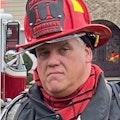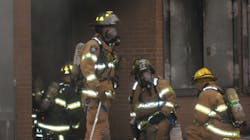Setting an Example & Creating Goals Can Deter 2/20 Syndrome
We have never been short on nicknames and acronyms in the emergency services. During my nearly three-decade tenure, I have a few favorites: RECEO, REVAS, COAL-WAS-WEALTH and SLICERS, just to point out a few. Nicknames for tools have made the rounds as well. Most people refer to their hydraulic spreaders as the “Jaws,” no matter what the brand is; the married Halligan and flat head are known as the "Irons" and engine personnel show their pride by grabbing the "pipe" when they line in. Sadly, I have heard a few new monikers that have been less than positive within our ranks: the 2/20 and the 3/30 handles where firefighters with two years on the department act as if they are 20-year members.
What’s in a name?
These tags are less than positive, and are becoming much more frequent within our ranks. These are reserved for firefighters who emanate a perceived aura of experience and skills of those with many years of fire and service under their belts, but who do not possess the time in grade needed to accumulate that level of expertise. In short, and please forgive my abruptness, they are the ones who walk among us but have yet to walk with us. They are the members who try to emulate the "been there, done that" fortitude that the senior staff have rightfully earned and deserve (see Photo 1).
A lifetime of development
There are very few professions that emulate as much pride as the fire service. Whether it is career or volunteer, there is always a level of pride and inner satisfaction that comes from belonging to your department. We stand up for it, we defend it, we boast about it to others, we fly the colors of our department on our patches and such, and we place it upon the pedestal of honor we hold it to, for all others to see (and envy.) But moreover, how we perform, and how we act, is what can provide the perception of what the department truly is. So what do these members provide in the form of perception?
Early on, the candidate is eager to learn, anxious to belong, and eager to become part of the team. The desire to belong, to embrace the esprit de corps, can impact a member’s ego and integrity, sometimes with catastrophic results. Who is the candidate exposed to within the ranks? Is there a mentorship/leadership program within the department where trusted leaders in the department can direct the candidate into the right path? Or, does the candidate grasp on to the group that is less than proactive? This author has witnessed candidates come through the local fire academy, set onto a path of success, only to be tainted by the virus that lurks within the ranks of their home department. These same candidates, who are the future of the fire service, are entrained into a tradition of stagnation, instead of supported to take the department to the next level.
Here is the damage assessment for this type of behavior: first and foremost, what does this attitude say to our customers who depend on us when they are having one of the worst days of their lives? Our customers operate under the impression that, whether career or volunteer, we are professional. My definition of professional is "…conforming to the technical or ethical standards of a profession." That means that we can do our job proficiently and efficiently. So pretending that we are proficient when we aren’t is less than ethical. Secondly, many true fire service professionals spent countless hours in training, spanning decades in this career honing their abilities. Their skills weren’t bought in a package, they didn’t come in a bottle and it certainly wasn’t "made up" on the fly. These skills came from research, scientific data and sweat. Anyone who thinks they can "fake" their way through the response is not only fooling the spectator, but damaging the credibility of the organization they belong to (see Photo 2).
A wise chief once told me. “Experience is what you get five minutes after you needed it." When we talk about experience, we focus on years of service, and not the service within those years. Case in point; I have enjoyed the privilege of sharing my passion of the fire service with brothers and sisters across the world, and no matter what the event, there is always something worth taking back to the troops in the trenches. The nearly three decades I have spent in the service have been both rewarding and beneficial to me and the members of my shift, and every year that has passed by, I have invested time and energy into continuing my education, and sharing those experiences with others. How many members of your department continue to further their education and experience? Do they truly have years of experience, or have they repeated the same experience, year after year…after year? If it is more the latter of the two, can you really be surprised when a new member becomes a 2/20? After all, they are confirming to the level that is being set for them.
- Prziborowski: 11 Steps to Overcoming 2/20 Syndrome
The answer is simple, really. Set the example that is expected of them. Our training is at the core of that solution. Our preparation of the future leaders has to have a correct blend of both education and training (see Photo 3). Historically, the fire service has a poor record of placing technology into operations well before the training for it is completed. The Navy SEALs have a saying: “You don’t rise to the occasion, you sink to the level of your training." Our performance in the emergency arena requires us to be able to adapt under pressure. To be able to adapt, we need to have a grasp of both the situation at hand and the technology we have to deal with that situation. To do that, consider training programs for your members that embrace "above average" results. Don’t just strive for mediocrity, but reach for perfection. In our profession, it just isn’t good enough to just be "good enough." Our relentless attention to detail is not meant to be demeaning, just the opposite; our preparation in training is what sets the bar for our performance out in the hot zone (see Photo 4). If you couple that with some real-world experience and response, this can be a real recipe for a successful career. Consider some skills and techniques that are learned from the scene; these lessons are what future training programs and techniques are based upon.
At the department level, the focus should be on providing innovative education and skills that are imparted informal sessions and company drills. The fire service is surrounded by personnel that believe that the job has to get done; we don’t say “no” to too many things that we are asked to do. To get the job done, the education must match the experience; the true experience. Having members that pseudo-walk the walk are not only damaging to the department’s reputation, but is significantly dangerous on the emergency scene. Take the time to prevent this within your ranks; make them earn the experience to "walk the walk."
Conclusion
A career in the emergency services goes through phases; the initial phase of development, the functional/operational phase, and the reinvestment phase. Reinvesting in the service is what forms the future generations of fire service leaders that step up behind us. It is hard to believe that someday we will pass the reins to the next generation of leaders, and move forward without us; that being said … What will you pass on with the reins?
Until next time, stay focused and stay safe.
About the Author

Michael Daley
MICHAEL DALEY, who is a Firehouse contributing editor, recently retired as a 37-year veteran who served as a captain and department training officer in Monroe Township, NJ. He is a staff instructor at multiple New Jersey fire academies and is an adjunct professor in the Fire Science Program at Middlesex County College. Daley is a nationally known instructor who has presented at multiple conferences, including Firehouse Expo and Firehouse World. His education includes accreditations as a Chief Training Officer and a Fire Investigator, and he completed the Craftsman Level of education with Project Kill the Flashover. Daley is a member of the Institution of Fire Engineers and a FEMA Instructor and Rescue Officer with NJ Urban Search and Rescue Task Force 1. He operates Fire Service Performance Concepts, which is a training and research firm that delivers and develops training courses in many fire service competencies.
